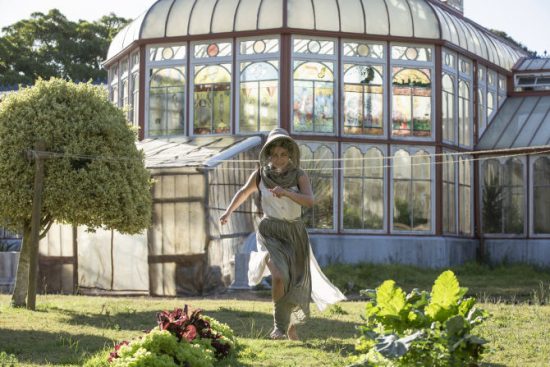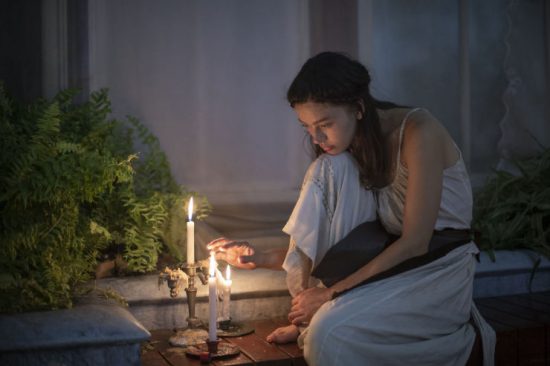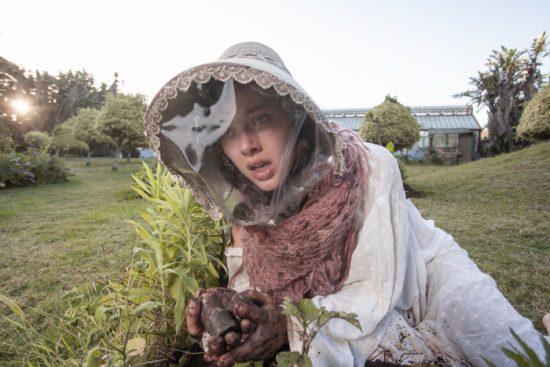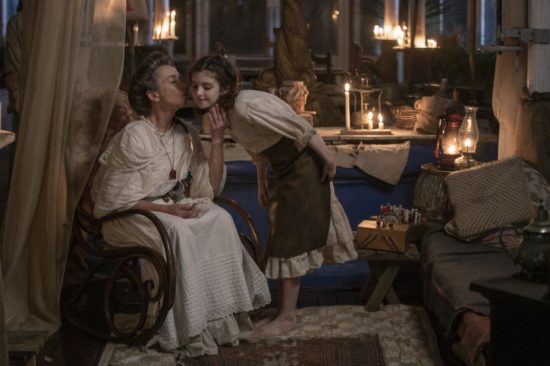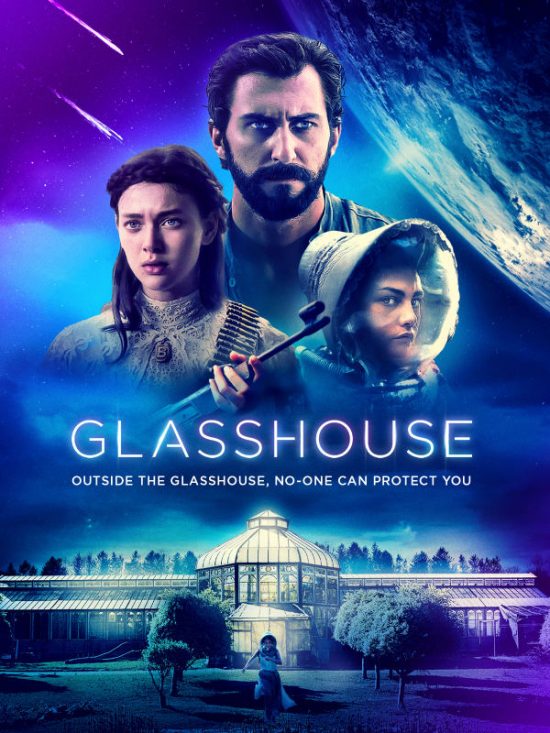Review: Glasshouse – “Beautifully crafted cinematography”
Directed by Kelsey Egan
Starring Jessica Alexander, Kitty Harris, Adrienne Pearce, Hilton Pelser, Anja Taljaard, Brent Vermeulen
In this intriguing, often almost dream-like dystopia, Kelsey Egan has crafted an unusual apocalypse: The Shred. An airborne virus that slowly destroys the memories of anyone exposed, piece by piece, until there is little left but animal instinct. The eponymous Glasshouse is a beautiful place, a botanical garden structure, one of those wonderfully airy, glass and steel structures the Victorians crafted so well in so many places, all descendants of the Crystal Palace from the Great Exhibition. Concealed by some of the last surviving greenery to protect it, it is a sanctuary, a safe place for several young women – Bee (Jessica Alexander), Evie (Anja Taljaard), and the very young Daisy (Kitty Harris), a single male, Gabe (Brent Vermeulen), overseen by their matriarch, Mother (Adrienne Pearce).
The Glasshouse is not just a safe place in a world that has fallen apart, the plant life nourished there feeds the small group, while also generating fresh oxygen in a sealed environment, that they can breathe without fear of inhaling The Shred (outdoors masks and air cylinders are required for protection). Understandably they protect this sanctuary – with any infrequent intruder most likely to be a Shred victim they simply shoot without hesitation; it’s a brutally efficient method we see early on when an approaching figure is gunned down without warning, then parts of his body harvested, chopped up and used to help fertilise the soil for plants in the Glasshouse, like a sacrificial offering to some plant god. Other religious overtones are apparent in the rituals the group observes, even the stained glass they have added to the Glasshouse, depicting their version of the events that lead them to this place.
It’s a very controlled, very female space – Gabe is the only male, a young man in body, but a child in mind due to exposure to The Shred. His greatest tragedy, perhaps, is that he was not exposed long enough to lose everything he was and become completely oblivious, which may have been more merciful. Instead, we see Vermeulen portrays the torture in his damaged mind, glimpses of half-erased memories, struggling to recall the words of the group ritual and failing, unable to manage it but aware enough to know he is failing. For any of us who have watched the cruel advance of dementia on a loved one, it’s painfully familiar and deeply emotional as we watch this half-life struggling on, part of him gone, but enough left to be slightly aware of what has happened to him.
Into this almost literally hermetically sealed bubble comes The Stranger (Pelser). Bee is on sentry duty, but fails to shoot The Stranger – she hesitates because he is wearing a gas mask. Is he untouched by The Shred? He collapses, she, against all the rules, brings him inside. Mother is not pleased, but with The Stranger confined to one room and in chains so he cannot go far, she can also see possibilities here – just as they pollinate their plants in the Glasshouse, they could use him to impregnate her oldest daughter, Bee.
But The Stranger’s arrival creates ripples in this contained eco-system of closed family and ritualised, selective remembrance – to begin with, it unbalances the existing gender dynamic by bringing in a male who is adult in both mind and body, unlike Gabe (who does not react well to this change). It also brings back to the surface the question of their missing brother Luca, who went out on an exploration mission but never returned. They repeat to each other that he will come back someday until it has almost taken on the overtones of The Second Coming, but it seems far more likely Luca lies dead somewhere, and if he never returns but The Stranger has come, what does that mean? No closed system can remain fully closed off forever, change is inevitable for both people and the environment.
This is a beautifully shot film – you’d never realise it was made on a micro-budget. The location, the Pearson Conservatory in South Africa, has been a location writer Emma Lungiswa de Wet has known since childhood, and she created the story with it in mind; she and director Kelsey and the production team were immensely fortunate the Nelson Mandela Bay Municipality, which administers it, were so open and helpful in letting them make the film there. The women’s clothing and the location give it a feeling that is at the same time pseudo-Victorian and yet timeless; the date is left ambiguous, and I was left with the impression this is our future, but one living in part of our shared past, essentially a world with little real future left, living in a memory of the old order, another metaphor for the film itself, in which our memories and our grasp of our own narratives, both individual and our shared societal memories, have been so badly disrupted.
There are echoes here of the oft-overlooked early Clint Eastwood film from 1971, The Beguiled, where Eastwood’s injured soldier is nursed to health in an isolated house filled only with women, upsetting the dynamic there (in that film the outside world is also in a state of chaos, this time from the raging US Civil War), while the isolated tending of remaining natural resources like plants under protective glass also stirs vague memories of another 70s film, eco-SF Silent Running. The South African setting also ties to this narrative which is about both enforced and chosen aspects of what people and groups forget or remember, or indeed even rewrite their pasts, something that land has had to do to move on. I think the more you consider it, the more this is a film you could find so many parallels to, both individual and on the larger scale, and that gives it a depth and emotional resonance, aided and abetted by beautifully crafted cinematography, excellently exploiting this unusual location, and a wonderfully tight small cast that showcases the increasing friction between trying to be a cohesive family living outside the ruins of the world and a desperate desire to be something else, even if it involves forgetting all.
Glasshouse is released by Signature Entertainment on digital platforms from February 7th.

